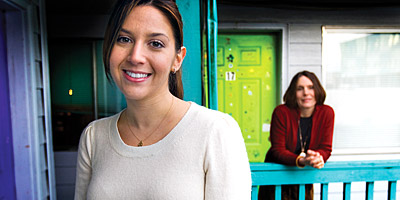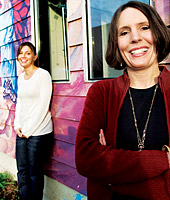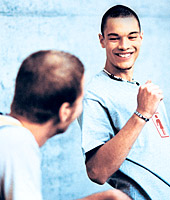The Hope Factor
Positive psychology
reveals principles
for life success

SPU doctoral student Lauren Shepherd (foreround) and Associate Professor Lynette Bikos conduct research at Cocoon House, a converted motel. Here, homeless and runaway teens are safe to regain their footing and a sense of direction for the future.
By Clint Kelly [ckelly@spu.edu]
Photos by Mike Siegel
“If you lose hope, somehow you lose the vitality that keeps life
moving, you lose that courage to be, that quality that helps
you go on in spite of it all.” —Martin Luther King Jr.
Billy, 14, has a history of severe abuse and neglect. He has lived in eight foster homes and two group homes. He is socially isolated in school and failing most of his classes, and believes that his foster-child status is a barrier to future success.
Tasha, 15, likewise suffered neglect and a great deal of physical and sexual abuse from her caregivers prior to living in three foster homes. Yet she excels in most of her classes, has many friends, plays varsity basketball, and plans to go to college and pursue a career in photography.
Last year, as a therapist at a foster child agency, Seattle Pacific University graduate student Lauren Shepherd worked with many adolescents, including Billy and Tasha. She was struck by the fact that although the teens had similar traumatic childhoods, some were depressed and falling behind at school, while others were happy, involved in healthy relationships, and making good grades. What is it that so dramatically separated their views of life? The inescapable answer seemed to be “hope.”

Taught by famed researcher C.R. Snyder, SPU psychologist Lynette Bikos (foreground) now examines hope with students such as Lauren Shepherd.
|
For her doctoral dissertation in clinical psychology at Seattle Pacific, Lauren Shepherd is researching hopefulness as a
protective factor in foster children. This hope, she says, is
not the pie-in-the-sky variety. It is the “I-believe-something-positive-will-happen” kind in which individuals learn to
succeed by setting reasonable personal goals.
“A kid might say he wants to become a rap star,” explains Lynette Bikos, associate professor of clinical psychology and director of research in SPU’s School of Psychology, Family, and Community. “The goal is to help him see that what’s more realistic is to write a rap song with a certain number of verses — that’s doable.” When he achieves that more attainable goal, self-worth rises, success breeds success, and hope produces fruit.
Bikos and Shepherd are both adherents of the relatively young field of positive psychology, which has scientifically demonstrated that people who thrive in life often possess the personality-related variable of hope. Teacher and student not only document the benefits of hope, but they also consider ways in which hope can be taught and learned.
“It’s exciting for SPU to acknowledge the science of the study of hope,” says Bikos, who joined the Seattle Pacific faculty in 2006. “SPU is also the perfect place to take a scientific look at religious faith and how it influences hope. I haven’t yet done any work with the faith component, but that will come.”
Her interest in the science of hope was greatly influenced by C.R. Snyder, one of the foremost researchers in the study of positive psychology. Bikos was his student in the social psychology course at the University of Kansas. Though Snyder, who died in 2006, suffered chronic pain all his life, he believed that hope was one of the most powerful human strengths.
Drawing upon Snyder’s influence, her own extensive teaching experience, and her work as a licensed psychologist and certified career counselor, Bikos has embarked on ambitious research
into the prevention of teen homelessness, where hope is a critical factor. Funded by an SPU faculty research grant, the study is a partnership between Seattle Pacific and nonprofit Cocoon House, the only resource serving homeless and runaway youth (ages 13–17) in Snohomish County, Washington.
In the past year, Bikos and her team have spent grueling hours on the phone with more than 800 families who have teens at risk of running away or becoming homeless. The project includes the teens’ parents, because, says Bikos, if parents are
taking proper care of themselves — and are more hopeful as a
result — the stress and pessimism that lead to runaways are reduced. At the conclusion of the first phone call, in which an action plan is developed and goals are set, preliminary data from Cocoon House suggests that 80 percent of parents experience an increase in hope about their own ability to handle the situations with their teens. Bikos and her students also plan to conduct a more scientific evaluation, testing a model of parental hope and self-care, parenting effectiveness, and other risk factors on the teen outcomes.
“Hopers are copers,” Bikos emphasizes. “If they encounter an obstacle, they are more likely to come up with ways to fix the situation. They put their eggs in more than one basket and expect to achieve their goals.”

Because they can be their own worst critics, teenagers often become self-absorbed with their own failings. Hope is renewed, say researchers, when teens learn to look outward and become "solution-focused hopers." |
Among the important aspects of hope research is establishing proven methods for increasing hope. To become more hopeful, Bikos encourages such principles as minimizing the negative and framing things more positively, looking outward rather than focusing on self, being solution-focused rather than problem-focused, cultivating hopeful relationships with those who know how to put adversity in perspective, praying and seeking spiritual direction, and exercising and maintaining a healthy diet.
She also urges people to prioritize their goals, to focus on those that are the most desirable. “Goals should stretch us,” she adds. “We need goal buddies who will give us feedback, and we need to be willing to amend or substitute our goals.”
Shepherd says it was her father who instilled hope in her at
a young age. “My dad drilled into my head that whatever you want to be, you can be. I remember writing down my goals in fourth grade and wanting to be a pediatrician. I wanted to help kids and relieve their pain.” She attended the University of Washington, intent on going to medical school, but along the line discovered she wanted to amend her goal and come at it a different way.
“Now I want to help kids with their emotional and mental well-being — especially those most at risk,” she says.
“Some think that a child’s early life experiences can predispose them to be more hopeful. What is often true is that a kid who does not receive attentive and responsive care tends to see the world as unforgiving and herself as worthless. Kids who feel unloved and uncared for are likely to believe that they are not worthy of goodness in their lives, and they won’t make plans to improve their lives in any way.”
Shepherd desires to break that cycle, to equip at-risk kids with optimism and a sense of ownership over their own lives.
“I think they can change the path they’re on — regardless of how traumatic their early experiences may have been,” she says.
Bikos comes from a family filled with “high hope.” They push through obstacles toward solutions, enjoying positive talk and laughter along the way. “Snyder spoke of pathways, or ‘way power’ — what is needed to go where you want to go,” she explains. “It’s learning to chop up your main goals into specific steps and devise multiple routes to achieve the desired end.
I’ve seen that with my own kids and with my 4-H group.
With intentionality and practice, you can program the result you’re after.”
Hopers, says the research, are less likely to experience anxiety and depression — not because they’re bent on winning, but rather because they simply enjoy being in the running.
“Which brings us back to Billy and Tasha, two foster children with similar experiences but very different outlooks,” says
Shepherd. “Tasha believes in her ability to achieve her goals and has a strategy for getting there, while Billy’s view of his own prospects, with a corresponding lack of goals, is bleak. The difference is their degree of hope.”
That’s why Shepherd, in her work with foster children, is eager to discover all she can about the causes of such differences: “If we can increase a child’s hopefulness in tomorrow, it appears to play a significant role in his or her overall mental health. It can be hard having hope for someone who doesn’t have hope for themselves, but even small progress is progress.”
Return to top
Back to Features Home
|